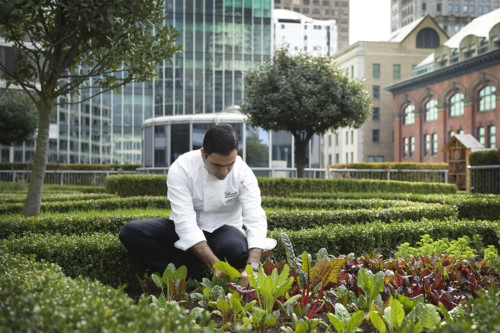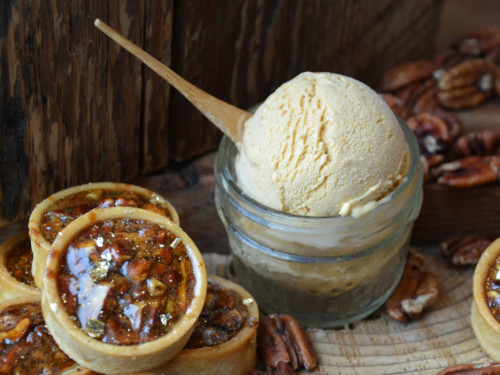
Vancouver’s Fairmont Waterfront Hotel is The Ultimate “Bee & Bee”
Mother Earth is like that working mom who never stops giving. Day in and day out, she keeps on growing the grass, planting the seeds of change, and cleaning up after her children. These days, Momma Earth is burning the candle at both ends, and it shows. (Sorry, Ma.) When most of us get weary, we take a holiday.
But Mother Earth can’t exactly take a vacation—unless she stays at Vancouver’s Fairmont Waterfront Hotel, that is. What’s the secret to running an eco-friendly hotel that’s sustainable and profitable? Eliminating food waste, growing your own organic fruits and vegetables, and providing a home to quarter of a million bees, of course.
Recently, Garden Collage caught up with the Fairmont Waterfront’s Kristyna Vogel, who chatted with us about sustainability, food waste, and what’s buzzing on the hotel’s rooftop garden.
The Rooftop Garden
In the hospitality industry, a commitment to sustainability makes perfect business sense, Vogel tells Garden Collage. “Throwing away food scraps is not only wasteful; it’s expensive,” she says. “Our chefs are always looking for creative ways to reduce food waste,” she adds “whether it’s using coffee grinds in a coffee cake, or the ends of vegetables in a stew.”
What’s the secret to running an eco-friendly hotel that’s sustainable and profitable? Eliminating food waste, growing your own organic fruits and vegetables, and providing a home to quarter of a million bees, of course.
At Fairmont Waterfront Hotel, you won’t catch the wait staff discarding food scraps either. Every plate of leftovers is used to fertilize the hotel’s 2,100-square-foot rooftop garden. Whether it’s hand-picked rosemary and lavender, or strawberries, figs, pumpkin, and rainbow chard, the hotel chefs regularly forage the rooftop garden for the freshest organic fare. “Fairmont Waterfront is a zero-waste hotel, which means that we need to divert 90 percent of our waste from landfills,” Vogel says of the hotel’s commitment to sustainability. “Whatever doesn’t get eaten is composted,” she adds. “A lot of the waste goes into the onsite worm composter, which converts food waste into a nutrient-rich fertilizer for the garden’s soil.” The rooftop garden is filled with a wide variety of plants and blooms, which is a dream come true for a special kind of hotel guest: the bee.
The “Bee” Hotel
In 2008, the Fairmont Waterfront Hotel welcomed its first colony of bees onto its rooftop, and the program has been a huge success ever since. The hotel offers bee tours, and just last summer alone, 1,000 people participated. From what Vogel tells us, the bees seem quite content with the arrangement too. “Our bees overlook the harbor, and they have one of the best views of the city,” Vogel says jokingly. The bees even have their own “Bee Butler” who tends to their every need. Having a lush garden to buzz around in can’t hurt either.
“When we first brought the bees onto the hotel rooftop, I thought, ‘this will be great for the garden,’” Vogel says. “But once you care for bees,” she adds “you can’t help but appreciate how important they are. “The bees have captured the hearts of everyone here at the hotel.”
Every plate of leftovers is used to fertilize the hotel’s 2,100-square-foot rooftop garden.
The hotel’s rooftop garden is also home to a species of bee that plays an important role in pollination: the mason bee. “Honey bees are great,” Vogel says “but mason bees don’t get nearly as much credit as they should. Since they come out earlier in the season, they play a crucial role in the pollination of our blueberries,” she adds. Mason bees don’t have a queen to protect, so they’re quite solitary, docile, and easy to care for. (Vogel calls them the “gateway bee.”)
Burnt-Honey Ice-Cream, Anyone?
The bees at Fairmont Waterfront produce roughly 125 pounds of honey every year (600 pounds total if you count the offsite hives), Vogel tells us. “We go through a ton of honey here at the hotel.” So, what do they do with all that honey? (We’re asking for a friend.) “Pretty much anywhere you can imagine using honey, we’ve done it,” Vogel says. The hotel serves an artisan cheese-and-bread plate and garden-to-glass cocktails infused with honey. The hotel also incorporates honey into dressings, and they mix honey into a house-made granola bar with dried cranberries. “My absolute favorite is the hand-churned burnt-honey ice-cream that we serve in our restaurant,” Vogel tells us. “Our chefs cook the honey just a little bit and mix it into the ice-cream, and it’s heavenly.”
Honey-&-Coffee Facial Scrub
The hotel makes a honey wax candle, honey-infused truffles, and a chocolate version of their Pollinator Hotel. Guests who book a stay under the hotel’s Bee Sustainability package are offered a jar of honey along with a mason bee house that they can take home with them. The hotel’s honey is even used in beauty treatments. “Myriam Laroche of Eco Fashion Week has used our honey and leftover coffee grinds as a facial scrub,” Vogel tells us. “She has the most beautiful complexion I’ve ever seen, so I’m definitely a convert.”
Fairmont’s bee initiative has been so successful that 25 of their international locations now care for bees, including the Royal York, the Plaza, the Savoy, and Fairmont hotels in Kenya, Dubai, and Washington. According to Vogel, Fairmont’s parent company, AccorHotels, has committed to putting in a thousand hotel gardens by 2020– because sustainability is as good for Mother Earth as it is for business.
The Fairmont Waterfront is located at 900 Canada Place in Vancouver, British Columbia. For more information, visit the hotel’s website.













































